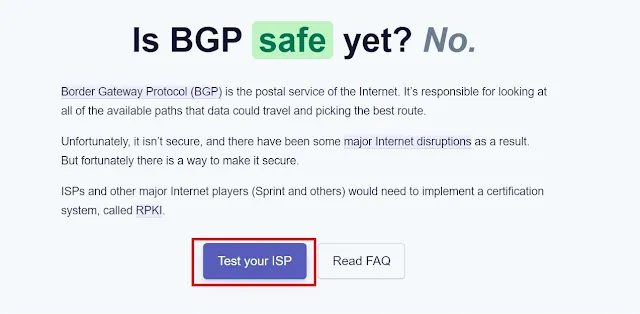Introduction
In today's digital age, cybersecurity is more important than ever. Most internet users assume their connection is secure, but what if your Internet Service Provider (ISP) isn't properly protecting your data? One of the biggest vulnerabilities in internet infrastructure is BGP hijacking, which can put your personal and sensitive information at risk.
In this article, we'll explore how BGP (Border Gateway Protocol) hijacking works, why it’s a major threat, and how you can test if your ISP is secure using Cloudflare’s "Is BGP Safe Yet?" tool. By the end, you'll know whether your ISP is taking the necessary security precautions—or if you should consider switching to a more secure provider.
What is BGP and Why Does it Matter?
The Border Gateway Protocol (BGP) is a crucial part of how the internet functions. It determines how data travels from one point to another across different networks. Whenever you access a website, send an email, or use an online service, BGP helps route that traffic through various networks efficiently.
However, BGP was not designed with strong security measures in mind. This lack of security makes it vulnerable to cyberattacks, specifically BGP hijacking. Hackers can exploit this weakness to redirect internet traffic, potentially sending users to malicious websites or intercepting sensitive data.
Understanding BGP Hijacking
What is BGP Hijacking?
BGP hijacking is a cyberattack where hackers manipulate BGP routes to misdirect internet traffic. Instead of reaching its intended destination, the traffic is rerouted to a malicious server controlled by attackers. This type of attack can be used for:
- Stealing personal and financial information (e.g., login credentials, credit card details)
- Injecting malware or phishing pages
- Eavesdropping on sensitive communications
- Disrupting online services
Because BGP hijacking happens at the network level, users often have no idea that their data is being intercepted or compromised.
Real-World Examples of BGP Hijacking
BGP hijacking is not just a theoretical threat—it has been exploited in real-world cyberattacks. Some notable incidents include:
- 2018: Google’s Traffic Hijacked – Hackers misrouted Google’s traffic through China and Russia, causing service disruptions and raising concerns over potential surveillance.
- 2017: Bitcoin Theft – Attackers used BGP hijacking to redirect traffic from cryptocurrency websites, leading to the theft of thousands of dollars in Bitcoin.
- 2013: Spamhaus Attack – A massive cyberattack against Spamhaus, an anti-spam organization, was partially enabled by BGP manipulation.
These cases highlight the importance of securing BGP to prevent cybercriminals from exploiting internet infrastructure.
How Can ISPs Protect Against BGP Hijacking?
To combat BGP hijacking, ISPs can implement RPKI (Resource Public Key Infrastructure). RPKI is a security framework that cryptographically verifies the legitimacy of BGP route announcements. It helps ensure that only authorized networks can advertise certain IP address ranges, preventing hijackers from rerouting traffic.
Despite its importance, many ISPs have yet to adopt RPKI, leaving their customers vulnerable to BGP hijacking attacks. This is why testing your ISP's security is crucial.
How to Check If Your ISP is Secure
Fortunately, you don’t need to be a cybersecurity expert to check whether your ISP is protecting your internet traffic. Cloudflare offers a simple online tool called "Is BGP Safe Yet?" that allows users to test their ISP’s security status.
Steps to Test Your ISP
1) Visit the test page (link provided below).
2) Click on the “Test your ISP” button.
3) Wait for the results to appear.
Understanding the Test Results
- If the result shows "Success" – Your ISP has implemented RPKI and is securing BGP routes properly. This means your data is less likely to be intercepted through BGP hijacking.
- If the result shows "Failure" – Your ISP has not implemented RPKI, leaving you vulnerable to BGP hijacking attacks.
What to Do If Your ISP Fails the Test
If your ISP fails the test, don’t panic—but do take action. Here are some steps you can take:
1. Contact Your ISP
Reach out to your ISP’s customer support and ask them whether they have plans to implement RPKI for BGP security. The more customers demand better security, the more likely ISPs will prioritize it.
2. Switch to a More Secure ISP
If your ISP is not taking cybersecurity seriously, consider switching to a provider that does. The “Is BGP Safe Yet?” test page includes a list of ISPs that support RPKI, allowing you to choose a safer option.
3. Use a VPN for Extra Protection
While a VPN (Virtual Private Network) won’t fix insecure BGP routes, it can provide an extra layer of encryption for your internet traffic. This reduces the risk of hackers intercepting your data, especially on unsecured networks.
Visualizing BGP Hijacking vs. Secure Traffic
Cloudflare’s website also provides visual examples of how BGP hijacking works:
- Unsafe traffic – Data is rerouted through a malicious server, allowing hackers to intercept and manipulate it.
- Secure traffic with RPKI – BGP hijacking attempts fail because RPKI verifies and blocks unauthorized route changes.
Seeing these visual representations helps users understand why securing BGP is essential.
Conclusion
BGP hijacking is a serious cybersecurity risk that can expose users to data theft, service disruptions, and other malicious activities. Unfortunately, many ISPs still do not implement RPKI, leaving their customers vulnerable.
By using Cloudflare’s "Is BGP Safe Yet?" tool, you can quickly check whether your ISP is protecting your internet traffic. If your ISP fails the test, take action—either by urging them to adopt RPKI or by switching to a more secure provider.
The internet should be a safe space for everyone, and securing BGP is a crucial step toward achieving that goal. Stay informed, stay secure, and take control of your online safety today!

%20Secure%20Test%20It%20Now!.webp)





Bro aapka help ka jarurat hai
ReplyDeleteAh, we're sorry for the delayed reply. Our comment moderator was away. We've spoken via IG, right? You're the same person?
Delete